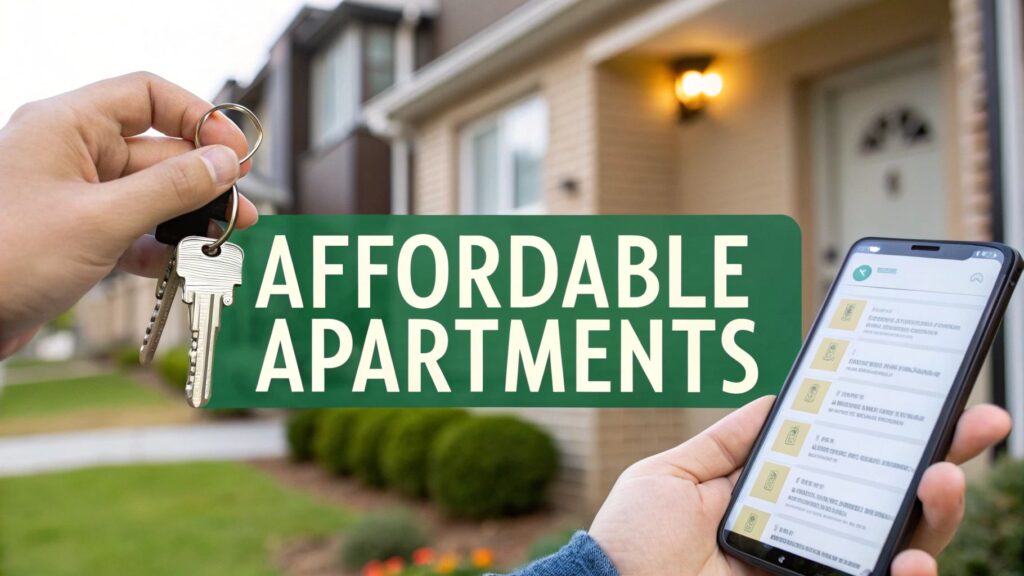So, you're on the hunt for an affordable apartment. The key isn't just luck; it’s about doing your homework before you even start scrolling through listings. You need to get a real handle on things like local rent-to-income ratios and neighborhood trends. Laying this groundwork first is what allows you to move fast and with confidence when the perfect place pops up.
Navigating Today's Competitive Rental Market
Before you jump into the listings, let's talk about what's actually driving rental prices. If finding a budget-friendly place feels like an uphill battle, it's because it often is. Big-picture economic factors—inflation, local job growth, and the available housing supply—all have a direct impact on your monthly rent.
Take a city like Boca Raton, for instance. The boom in remote work has brought a whole new wave of people to the area, cranking up the demand for apartments and, you guessed it, the prices. This isn't meant to be discouraging. It's about being smart. When you understand the market forces at play, you can set a budget that makes sense and spot a genuinely good deal when it comes along.
Understanding Affordability on a Global Scale
What "affordable" means can change drastically depending on your zip code. A recent global study really puts this into perspective, showing that renters around the world are now spending an average of 38% of their disposable income on rent. While North America is still on the more affordable side of the spectrum, renters in many Asia-Pacific cities are feeling a much tighter squeeze. You can dig into the specifics in the 2025 Housing Affordability Review by DWS.
This infographic breaks down some of the key numbers, comparing the global average rent burden to what people are paying in specific regions.
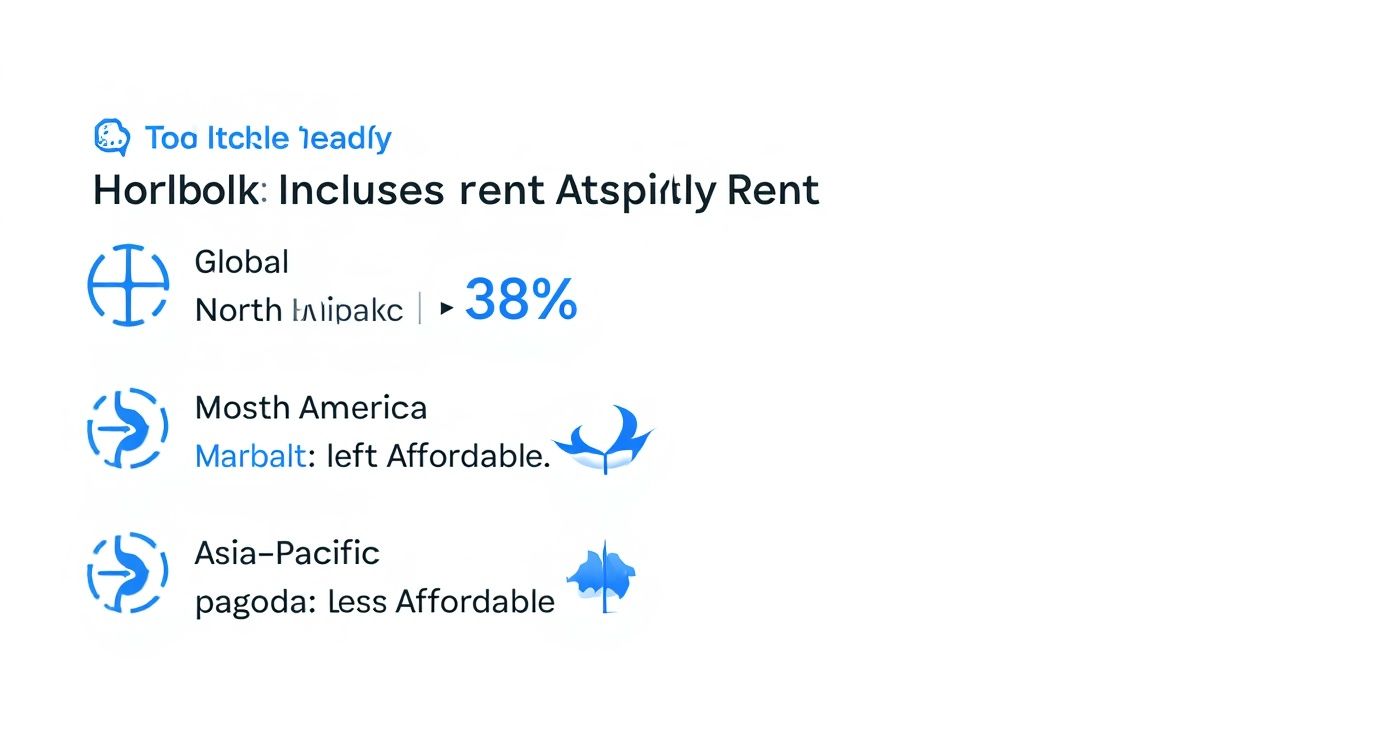
The takeaway is clear: while affordability is a worldwide conversation, the economic climate right in your backyard is what matters most for your apartment search.
Setting Realistic Expectations for Your Search
Armed with this context, you can approach your apartment hunt with a much clearer mindset. Instead of getting bogged down by sticker shock, you can channel that energy into the things you actually have control over. That means knowing your budget down to the dollar and being ready to pounce when you find a match.
Pro Tip: The mission isn't just to find a cheap apartment. It's to find the best value for your money. That means weighing the monthly rent against other critical factors like location, included amenities, and the cost of your daily commute.
Ultimately, being prepared is your biggest asset in a competitive market. Here’s a quick roadmap to help you organize your approach.
Your Affordable Apartment Hunting Roadmap
This table breaks down the entire process into manageable stages, so you know exactly what to focus on and when.
| Stage | Key Action | Why It's Important |
|---|---|---|
| Financial Prep | Calculate your budget using the 30% rule; check your credit score. | Lays a solid foundation and shows landlords you're a reliable applicant. |
| Market Research | Identify target neighborhoods and research average rent prices. | Sets realistic expectations and helps you spot a good deal instantly. |
| The Search | Use a mix of online listing sites and local resources. | Casts a wider net and uncovers hidden gems you might otherwise miss. |
| Tours & Vetting | Schedule viewings, ask smart questions, and inspect for issues. | Ensures the apartment meets your needs and avoids future headaches. |
| Application | Have all your documents (pay stubs, ID, references) ready to go. | Speed is crucial; being prepared can put your application at the top of the pile. |
| Lease Review | Read the entire lease agreement carefully before signing. | Protects your rights and clarifies all your responsibilities as a tenant. |
Think of this as your game plan. It turns a potentially overwhelming process into a series of clear, actionable steps.
Once you have a firm grasp of the market and your finances, you can start exploring the most effective platforms to find your next home. To help you get started, we've put together a guide on the top apartment finding sites to make your search more efficient.
Building a Realistic Rental Budget
Before you even start scrolling through apartment listings, you need to know your numbers. It’s the single most important step in finding a place you can actually afford, not just one you can squeak by in.
A lot of people still quote the old 30% rule, which suggests capping your rent at 30% of your gross income. But let’s be honest, that rule is a relic. It completely ignores the realities of modern life—things like taxes, student loan debt, and the wild differences in utility costs from one city to another.
Instead of clinging to an outdated percentage, it's time to build a budget that reflects your life and your spending. That means looking at your actual take-home pay and getting real about where every dollar goes.
Calculating What You Can Genuinely Afford for Rent
The best way to do this is to become a detective of your own spending for a month. Get a notebook or a spreadsheet and track everything. This isn't about feeling guilty for buying that morning coffee; it’s about collecting cold, hard data so you can make a smart financial decision.
Your list should include all the non-negotiable expenses that come out of your pocket each month:
- Utilities: Think electricity, water, and trash services.
- Connectivity: Your internet and cell phone plans.
- Getting Around: Car payments, insurance, gas, or public transit costs.
- Food: What you spend on both groceries and dining out.
- Subscriptions: All those little recurring charges like streaming services and gym memberships.
- Debt Payments: Student loans, credit card bills, and any other loans.
- Savings: What you’re putting away for retirement, emergencies, or other goals.
Once you subtract all of that from your monthly take-home pay, what's left is the absolute maximum you can comfortably spend on rent. You’ll probably find this number looks a lot different than what a simple 30% calculator told you. To get this right, you'll need to have some essential money management skills in your back pocket.
Want a better idea of what to expect for utilities in Boca? Our guide on utility costs for apartments breaks down the typical expenses you’ll encounter.
Get Your Financial Paperwork in Order
With your budget firmly in hand, the next step is to assemble your application "go-bag." When you find the right place, you want to be able to move fast. Landlords are looking for proof that you’re a reliable tenant who pays on time, and having your documents ready makes you look like a pro.
Key Documents to Have Scanned and Ready:
- Proof of Income: Your last two or three pay stubs are the gold standard. If you’re self-employed, get your most recent tax returns or several months of bank statements ready to go.
- Bank Statements: This shows the landlord you have the cash on hand for the security deposit and the first month's rent.
- Photo ID: A driver’s license or another government-issued ID is a must.
Your credit score is another massive piece of the puzzle. It's the first thing a landlord looks at to gauge your financial responsibility. A strong score doesn't just get you approved; it can give you an edge over other applicants. If your score is a little lower than you’d like, start working on it now by paying bills on time and chipping away at any credit card debt. A little effort here can make a huge difference in your apartment search.
How to Find Apartment Deals That Aren't Advertised Online
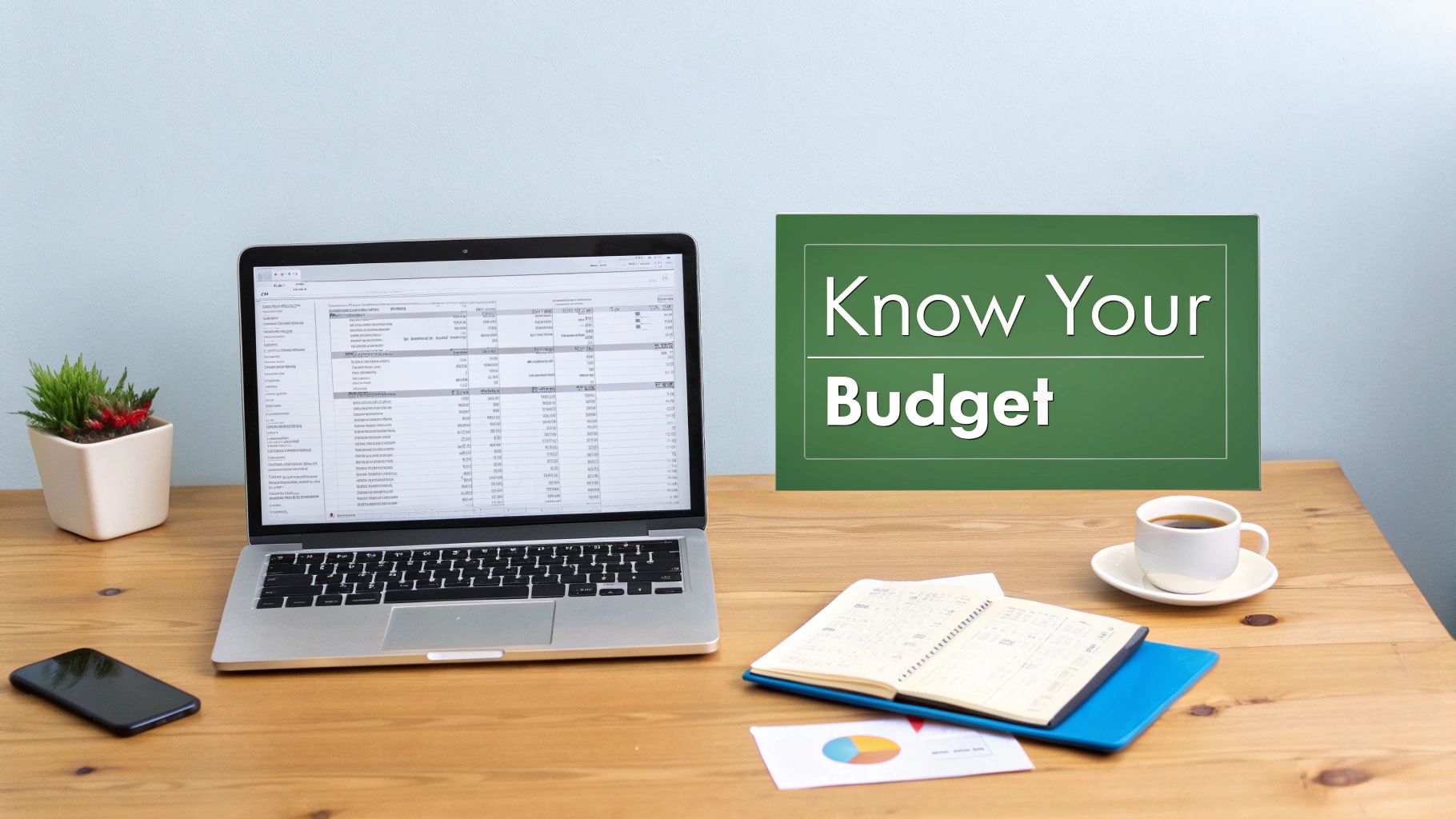
The best affordable apartments often fly under the radar, never making it to the big rental websites. If you want to snag one of these hidden gems, you’ll need to think beyond your browser and get a little creative with your search. A hands-on approach puts you way ahead of the competition, letting you discover fantastic deals before they ever go public.
This hunt for value is more critical than ever. We're in the middle of a global housing shortage, which is making the search for an affordable place incredibly competitive. In fact, research points to a need for an additional 6.5 million housing units in developed economies just to meet the current demand. That gap puts serious pressure on rental markets, so you need smarter strategies to find a place that actually fits your budget. You can dig deeper into this global housing trend on Hines.com.
Think Like a Local
Your first move should be to tap into the community’s pulse. This is where you’ll find listings from smaller, independent landlords who often skip the mainstream platforms altogether.
- Neighborhood Social Media Groups: Jump on Facebook and search for groups like "Boca Raton Rentals" or "South Florida Apartments." Landlords love posting here because they can find local tenants fast.
- Community Boards: Don’t write off old-school methods. Check the bulletin boards at local coffee shops, libraries, and community centers in the neighborhoods you’re interested in. You’d be surprised what you can find.
- Word of Mouth: Tell everyone you know that you're looking. A friend, coworker, or family member might know someone with a unit about to open up. A personal referral can make all the difference.
Get Proactive and Hit the Pavement
Waiting around for the perfect listing to pop up on your screen is a losing game. You have to take control and actively seek out opportunities yourself.
Honestly, one of the most effective tactics is just getting in your car or putting on your walking shoes. Drive or stroll through the neighborhoods you love and keep your eyes peeled for "For Rent" signs posted outside smaller apartment buildings, duplexes, or condos. These are often managed directly by the owners, who might be more flexible on pricing and lease terms than a large corporation.
Insider Tip: Found a building you love but don't see a sign? Don't be afraid to ask. If there's a leasing office or you see a building manager, pop in and inquire about upcoming vacancies. You can often get on a waitlist before a unit is ever advertised to the public.
Fine-Tune Your Online Search
While getting offline is crucial, you shouldn't abandon digital tools. The trick is to use them strategically to cut through the noise and spot the real value.
- Set Up Smart Alerts: On whatever rental sites you're using, create highly specific search alerts. Filter by your absolute maximum price, your ideal move-in date, and any must-have amenities. This ensures you only get notified about listings that are a genuine fit.
- Hunt for Special Offers: Many larger, well-managed apartment communities run promotions to fill vacant units quickly. For instance, Cynthia Gardens often has deals you can check out. Always look for a community's apartment move-in specials page—it can seriously lower your upfront costs.
By blending these real-world tactics with a smarter online search, you turn your apartment hunt from a passive scroll-fest into an active, strategic mission. This multi-pronged approach is your best bet for uncovering a fantastic, affordable apartment that everyone else is going to miss.
Touring Apartments Like a Pro
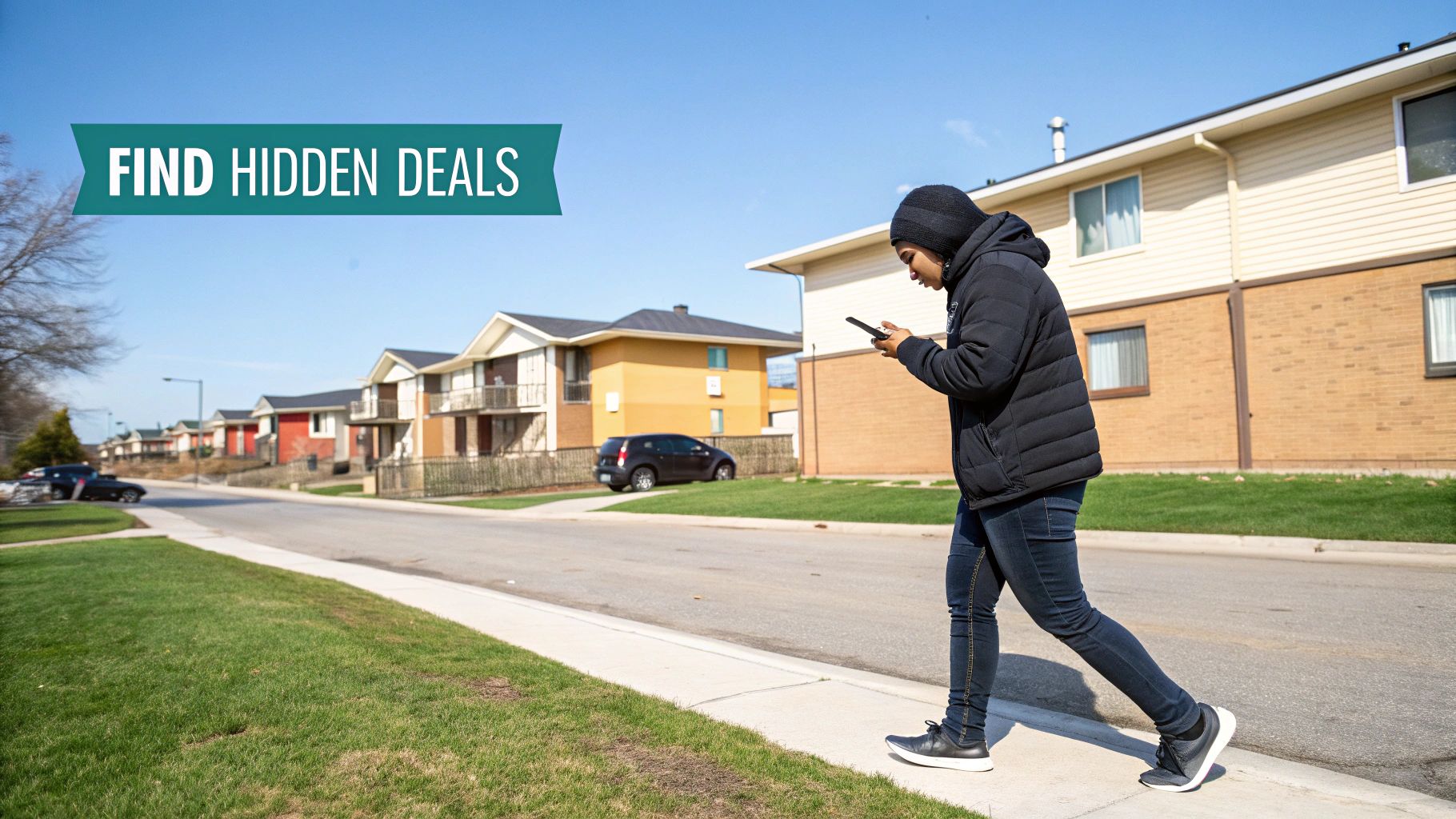
You’ve done the legwork and have a few tours scheduled. This is when your apartment hunt gets real. Whether you’re seeing a place in person or taking a virtual tour, your mission is to put on your detective hat and see past the fresh paint and pristine staging.
It’s so easy to get caught up in the excitement of a beautiful space. But this is precisely the time to be critical and methodical. You’re not just finding a place to sleep; you're making a significant decision that will affect your daily life for at least the next year. This is your chance to confirm if the apartment lives up to its online hype.
Look Beyond the Surface
Anyone can appreciate a nice view or shiny new appliances. Your job is to spot the things most people miss. Property managers are experts at presenting a unit in its best light, which can sometimes mean glossing over potential problems.
This is where you need to get granular. A freshly painted patch on the ceiling might look nice, but it could be covering up a recent leak.
A few pro tips I've picked up over the years:
- Bring a phone charger and test a few outlets in each room. It’s a dead-simple way to spot electrical issues.
- Turn on the faucets and the shower. How’s the water pressure? Does the hot water actually get hot, and how long does it take?
- Open every cabinet and closet. You're looking for any tell-tale signs of pests—droppings, traps, or strange smells. These are the little red flags that can become major headaches down the road.
Key Insight: A tour isn't just about admiring the layout. It's about uncovering potential deal-breakers. A thorough five-minute check can save you from a twelve-month lease you'll regret.
Ask Smart Questions
The leasing agent is your best source of information, but you have to know what to ask. Don't be timid about it. Asking detailed questions shows you're a serious, responsible applicant, not just a casual looker.
I always recommend coming with a written list of questions. It keeps you from forgetting crucial details in the moment and helps you compare apples to apples between different properties. This is especially vital when you’re on a tight budget, as hidden fees can throw everything off.
Here Are Some Questions You Shouldn't Leave Without Asking:
- What are the average monthly utility costs for an apartment this size? (This is key for accurate budgeting.)
- What’s the guest parking situation like? (Save your friends a headache later.)
- How do you handle after-hours emergency maintenance requests? (You need to know there's a solid plan.)
- Can you walk me through the specifics of the pet policy, including all fees and deposits?
- Has this unit had any history of pests or water damage in the last year or so? (Pay close attention to how they answer this one.)
Evaluate the Whole Property, Not Just the Apartment
Your inspection isn't over when you walk out of the unit's front door. Take a stroll around the entire complex.
Are the common areas—hallways, laundry facilities, pools, and mailrooms—clean and in good repair? The state of these shared spaces is a direct reflection of the property management's standards.
For a community like Cynthia Gardens, you also want to think about the overall value proposition. Check out the amenities yourself. Does the on-site laundry look convenient and well-kept? Is the landscaping maintained? It's also a great idea to do a trial run of your commute during rush hour. Paying slightly more in rent might be a fantastic trade-off if it cuts 30 minutes off your daily drive time. This bigger-picture view helps you choose a true home, not just four walls and a roof.
How to Secure Your Apartment and Negotiate the Lease
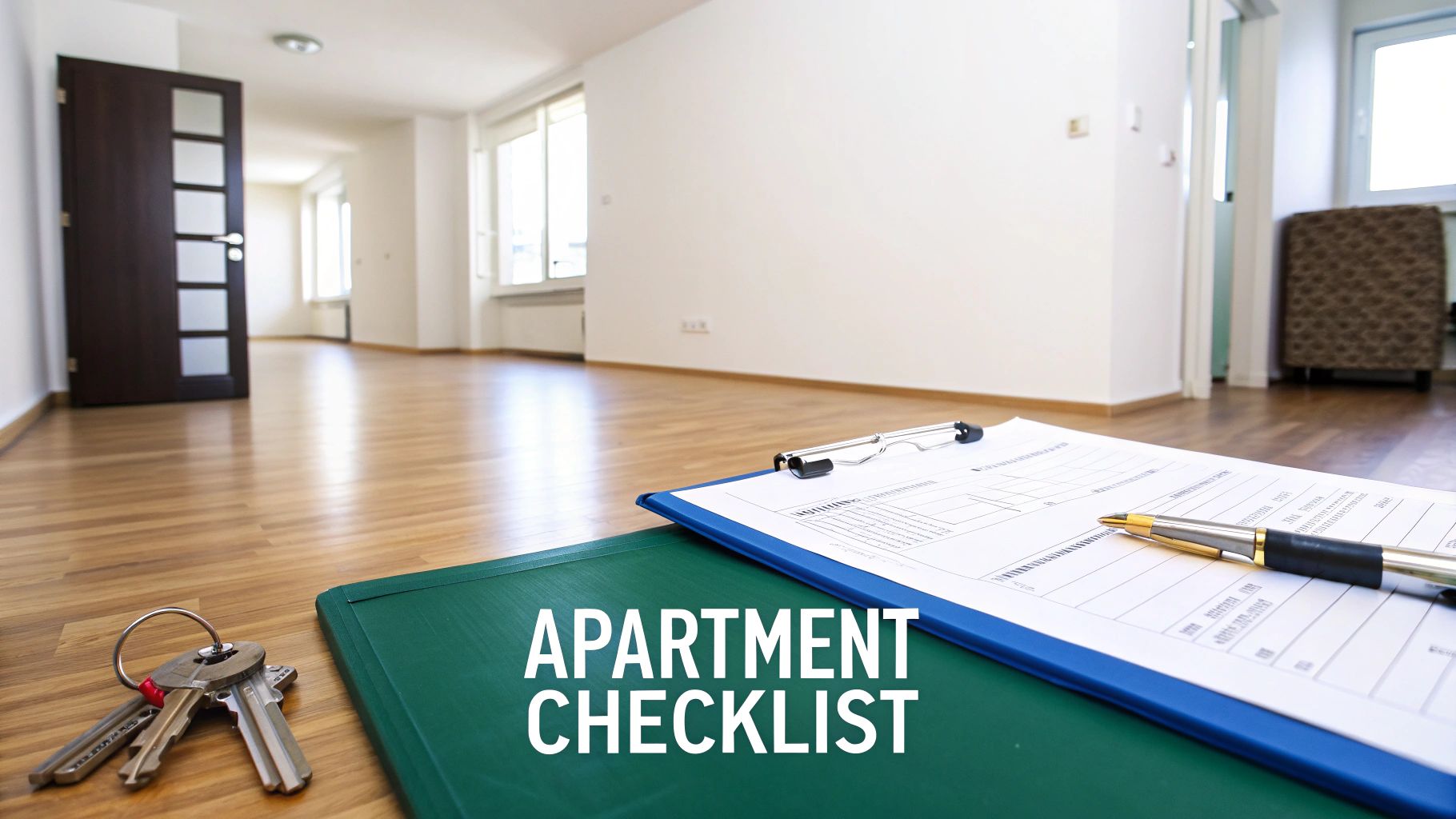
Finding the perfect apartment feels like crossing the finish line, but there are still a few crucial steps left. Now it's time to make your application shine and lock in the best possible lease terms for your new home.
Think of your rental application as your first impression—it's basically a resume for being a great tenant. Have your documents ready to go before you even start looking. That means having digital copies of your pay stubs, bank statements, and a photo ID ready to send at a moment’s notice.
I always recommend adding a short, professional cover letter. A few simple sentences introducing yourself, explaining why you're excited about that specific apartment, and confirming you meet the income requirements can make you stand out from a pile of identical applications. It’s a small touch that shows you’re serious.
The Art of Gentle Negotiation
Many people believe a lease is a take-it-or-leave-it deal, but that’s a common misconception. While you’re not going to rewrite the entire contract, there’s often more flexibility than you think, especially if you’re a well-qualified applicant.
Being prepared is key. Knowing some proven strategies for negotiating rent effectively can give you a real advantage when you sit down to talk.
You might be surprised where you can find some wiggle room:
- Move-In Date: If an apartment is already empty, the landlord is losing money every day it sits vacant. They may be more than willing to let you move in a few days early and prorate the rent.
- Parking Fees: In buildings with plenty of open parking, the monthly fee might be negotiable. It never hurts to ask if they can reduce or waive it.
- Cosmetic Changes: Want to paint the walls? Many landlords will agree, as long as you promise to return them to the original neutral color when you move out.
What You Can (and Can't) Negotiate in a Lease
Knowing where to focus your energy is half the battle. This table gives you a quick look at lease terms that are often negotiable versus those that are usually set in stone.
| Lease Clause | Potential for Negotiation | Example Strategy |
|---|---|---|
| Rent Price | Low | Frame your offer around a longer lease term. "Would you consider $2,150 instead of $2,200 if I sign an 18-month lease?" |
| Move-in Date | High | If the unit is vacant, ask to move in early to help the landlord fill it faster. "The unit is ready now; could I move in on the 25th and pay a prorated amount?" |
| Parking Fees | Medium | If spots are plentiful, ask for a reduction. "Since there are many unassigned spots, would you be open to reducing the parking fee by 50%?" |
| Pet Policies | Very Low | Non-negotiable rules like "no dogs over 25 lbs" are rarely flexible due to insurance and building policies. |
| Lease Length | Medium | Landlords often prefer longer leases but may accept a shorter one (e.g., 10 months) to avoid a winter vacancy. |
| Amenity Fees | Low to Medium | Sometimes bundled fees for things like a gym or pool can be discussed, but it's rare. |
| Painting/Minor Alterations | High | Most landlords will agree to cosmetic changes if you agree in writing to restore the unit to its original condition upon moving out. |
Remember, your goal is to be a reasonable and attractive tenant. A polite, well-thought-out request is far more likely to be successful than a demanding one.
Performing the Final Lease Review
Before your pen ever touches that paper, read the entire lease agreement. Seriously. Every single word. This is a legally binding document, and claiming you "didn't realize" something was in there won't help you down the road.
Pay extra attention to clauses about breaking the lease, guest policies, penalties for late rent, and the exact process for getting your security deposit returned. If anything seems confusing or contradicts what you discussed verbally, ask for clarification—and get it in writing.
Once you’re completely clear on the terms and feel good about the agreement, you can sign with confidence. You’ve officially secured your new home
Answering Your Top Apartment Hunting Questions
When you're deep in the apartment search, you're going to hit a few bumps and have questions you hadn't even thought of. This section is designed to be your go-to guide for those tricky situations we see renters face all the time. Think of it as a cheat sheet to help you navigate the process with confidence.
Knowing the answers to these common questions can genuinely make the difference between a stressful search and finding an affordable apartment that fits your budget and your life.
What Is the Best Month to Look for an Affordable Apartment?
Believe it or not, timing your apartment hunt can have a massive impact on both price and what's available. The rental market is surprisingly seasonal, and if you know its rhythm, you can gain a real advantage.
The sweet spot for finding a deal is usually in the winter, specifically from December to February. Demand takes a nosedive because most people don't want to deal with moving during the holidays or in colder weather.
This dip in competition often means you’ll find lower prices and more landlords willing to negotiate. On the flip side, summer is the peak season. From May to August, you’ll face a swarm of other renters, higher prices, and apartments that get leased almost as soon as they're listed.
How Can I Rent an Apartment with a Low Credit Score?
A less-than-perfect credit score isn't an automatic rejection, but it does mean you need to be strategic. The trick is to get ahead of the issue and give the landlord every reason to see you as a reliable tenant.
Being upfront about your situation from the get-go builds trust. You can make a weaker application much stronger in a few ways:
- Offer to pay a larger security deposit—maybe two months' rent instead of one.
- Bring glowing letters of recommendation from previous landlords or even your employer.
- Show proof of stable, consistent income and a healthy savings account.
- Find a guarantor or cosigner with a strong credit history to back your lease.
By presenting yourself as a prepared and responsible applicant, you can often overcome the hurdle of a low credit score and prove you’ll be a great tenant.
Are Apartment Application Fees Refundable?
This is a really common point of confusion, and the honest answer is: it depends. As a rule of thumb, standard application fees are non-refundable. These fees, usually between $25 and $75, cover the property manager's cost to run your credit and background checks.
However, don't mix this up with a "holding fee." A holding fee is a separate, larger deposit you might pay to take a specific unit off the market while your application is processed. If your application is denied for some reason, this holding fee is often refundable.
The best advice? Always ask for clarification on the refund policy for any money you hand over, and make sure you get it in writing. It avoids a lot of headaches later.
Is It Better to Rent from a Large Company or a Private Landlord?
There are real pros and cons to both, and the right choice comes down to what you value most in a rental experience.
A large property management company, like the team at Cynthia Gardens, typically offers more structure and amenities. You can expect things like convenient online portals for rent payments, dedicated maintenance crews for quick repairs, and professionally managed common areas. The trade-off is that they can be more rigid with lease terms and credit requirements.
On the other hand, a private landlord might offer more flexibility. They could be more willing to negotiate the rent, adjust the move-in date, or be more understanding of a unique credit situation. The downside is that they might be slower to handle maintenance requests and won't have the same resources as a larger company.
Ready to find a comfortable and affordable home in a prime Boca Raton location? The team at Cynthia Gardens is here to help you find the perfect one-bedroom apartment to fit your needs. Explore our available floor plans and see why our community is the ideal place to call home.
